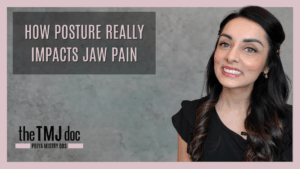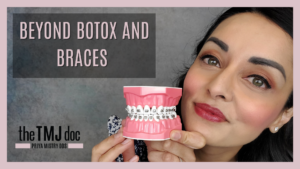Many people struggling with tinnitus, a persistent ringing, buzzing, or hissing in the ears hear that there’s “no cure.” But for some, the origin isn’t in the ear at all. It’s in the jaw joint (TMJ). Dr. Priya Mistry often sees patients whose tinnitus shifts with jaw motion or whose ear sounds intensify with chewing. This isn’t coincidence, it may be the jaw playing a role in what you hear.
Here’s how TMJ can contribute to tinnitus, how to spot when it’s involved, and steps you can take toward relief.
Why TMJ Could Be Causing or Worsening Tinnitus
Other Causes Must Be Ruled Out First
Because tinnitus has many possible origins, the first step is ensuring your ears, nerves, and hearing pathways are healthy.
Common culprits include:
- Hearing loss (noise exposure, age-related degeneration)
- Middle ear problems (e.g. fluid, eustachian tube dysfunction)
- Ear or sinus infections
- Medication side effects
- Head or neck injuries
If those are excluded and the tinnitus persists, then TMJ-related causes deserve serious consideration.
Classic Signs That Hint TMJ Is Involved
- Ear sounds change when you move your jaw
If the ringing shifts in pitch, loudness, or quality when you open your mouth, chew, or tilt your head, that’s a strong red flag. This phenomenon is known as somatic tinnitus. - Tinnitus flares after heavy jaw use
People often report louder buzzing after extended chewing, talking, or clenching, especially under stress. That suggests the TMJ muscles or joints are influencing the inner ear. - You have other TMJ symptoms
Tinnitus rarely shows up in isolation when it’s TMJ-related. Look for jaw pain, clicking or popping, limited opening, facial tension, or muscle soreness in the temples or neck. - More severe tinnitus tends to align with TMJ cases
Research shows that tinnitus associated with TMJ is often louder, more bothersome, and more disabling than tinnitus alone.
How TMJ & Ear Structures Connect
The jaw and the ear are neighbors in both anatomy and function.
Here are some of the ways the TMJ can influence ear sensations:
- Muscle attachment influence — Some jaw muscles share proximity or connections with ear structures. Tension in those muscles can transmit vibrations or pressure.
- Joint pressure on the temporal bone — The TMJ abuts the temporal bone, which houses the middle and inner ear. Misalignment or inflammation can disturb ear bone, nerve, or fluid dynamics.
- Nerve cross-talk — The trigeminal nerve, which serves the jaw, shares central pathways with auditory nerves. Irritation or abnormal signals in one region can influence perception in the other.
Because of these interconnections, changes in jaw position or joint stresses can modulate what you hear.
What The TMJ Doc Would Do to Assess & Treat
When Dr. Priya suspects that TMJ may be at play, the plan looks like this:
- Full TMJ evaluation
Including joint motion, muscle palpation, bite alignment, cervical assessment, and jaw movement tests. - Imaging and diagnostics
If needed, order CBCT, MRI, or joint scans to examine joint structure, disc position, and bone health. - Trial of conservative therapy
Begin gentle jaw rest, habit counseling (avoid hard foods, chewing gum, clenching), and relaxation techniques. - Precision appliance therapy
A custom oral splint or appliance can reduce undue load on the joint and muscles, which often calms tinnitus symptoms. - Adjunct therapies
Include physical therapy for neck/upper back, posture correction, neuromuscular re-education, breathing strategies, and possibly nerve or muscle treatments. - Monitoring and refinement
Track tinnitus response over time; if ear sounds shift, jaw mechanics may be further refined to target them.
In many cases, TMJ-focused treatment reduces or even eliminates the tinnitus. In fact, Michigan’s TMJ & Sleep team shared a case where a patient’s tinnitus resolved after about four months of TMJ therapy.
What You Can Try at Home (While You Pursue Professional Care)
These self-care strategies don’t replace a full TMJ evaluation, but can help reduce the strain while you wait:
- Use a soft diet (avoid very hard, chewy foods)
- Be mindful of jaw rest. Don’t hold your phone with your jaw, avoid prolonged chewing
- Practice jaw-relaxing exercises (gentle opening/closing, controlled motion)
- Apply warm compresses to jaw/temple areas
- Incorporate stress-management, meditation, gentle breathing, stretching
- Maintain ergonomic alignment, especially head/neck posture
These efforts can reduce the burden on the TMJ and may lessen tinnitus fluctuations.
Is Your Tinnitus TMJ-Related? When to Act
You should strongly consider a TMJ evaluation if:
- You hear tinnitus that changes with jaw motion
- You’ve had episodes of TMJ pain, clicking, or jaw tension
- Your tinnitus flares with jaw-heavy activities
- You’ve already ruled out ear pathologies without success
A combined approach, treating ears and jaw together, often yields the best outcome.
Why suffer when relief may be possible?
The TMJ Doc offers expert, integrated care to uncover the root cause of your tinnitus and bring true, lasting relief.






